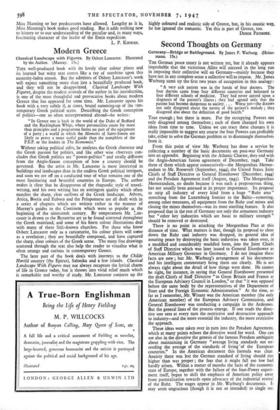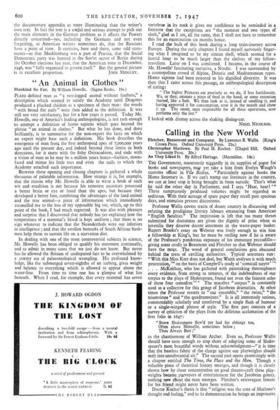Second Thoughts on Germany - THE German peace treaty is
not written yet, but it already appears improbable that the victorious Allies will succeed in the long run in imposing their collective will on Germany—mainly because they have not in any complete sense a collective-will to impose. Mr. James Warburg sums up the first two years of occupation in this analogy: "A very sick patient was in the hands of four doctors. The four doctors came from four different countries and belonged to four different schools of medicine. They had never agreed upon a diagnosis of the patient's illness ; they had agreed only that the patient had become dangerous to society.... Worse yet—the doctors not only disagreed about the nature of the patient's malady ; they disagreed also about the definition of good health."
True enough ; but there is more. For the occupying Powers not only disagreed among themselves ; each of them changed his own ideas from time to tame. Unless we can trace these changes it is really impossible to suggest any course the four Powers can profitably take, either to solve the German problem or to disentangle themselves from it.
From this point of view Mr. Warburg has done a service by collecting a number of the basic documents on post-war Germany into an appendix. Beginning with the Atlantic Charter, they end with the Anglo-American fusion agreement of December, 1946. Take three of them which appear consecutively—the Morgenthau Memor- andum to Mr. Roosevelt (September, 1944), the United States Joint Chiefs of Staff Directive to General Eisenhower (December, 1944) and the Potsdam Agreement itself (August, 1945). The Morgenthau Memorandum, no doubt because it was such a preposterous thing, has not usually been assessed at its proper importance. Its proposal to strip all industry of every kind from a huge " Ruhr area " stretching from the Luxemburg frontier to the Baltic—removing, among other measures, all equipment from the Ruhr coal mines and closing the mines themselves—was its most startling feature. It also proposed that in the rest of Germany not only the armament industry but "other key industries which are basic to military strength " should be removed or destroyed. .
There is no point in attacking the Morgenthau Plan at this distance of time. What matters is that, though its proposal to close down the Ruhr coal industry was dropped, its general idea of assuring peace by destroying the basic industries was taken over, in a modified and considerably muddled form, into the Joint Chiefs of Staff Directive which was later issued to General Eisenhower as American Military Governor in Germany. I do not imagine these facts are new ; but Mr. Warburg's arrangement of his documents and his intelligent commentary bring them out clearly. He is not always right about the detail of how things were done. He cannot be right, for instance; in saying that General Eisenhower presented the draft Chiefs of Staff Directive " to Great Britain and France at the European Advisory Council in London," or that " it was opposed before the same body by the representatives of the Department of State and the Foreign Economic Administration." At the time, so far as I remember, Mr. Winant was the American member (the only American member) of the European Advisory Commission, and General Eisenhower was conducting a campaign in the Ardennes. But the general lines of the process emerge. If one reads the direc- tive one sees at every turn the restrictive and destructive approach to industry—and.the more essential the industry, the more restrictive the approach.
These ideas were taken over in turn into the Potsdam Agreement, which at many points echoes the directive word for word. One can see also in the directive the genesis of the famous Potsdam ambiguity about maintaining in Germany "average living standards not ex- ceeding the average of the standards of living 'of the European countries." In the American document this formula was clear. Anxiety there was lest the German standard of living should rise higher than was proper ; the fear that it might fall too low had hardly arisen. Within a matter of months the facts of the economic state of Europe, together with the failure of the four-Power experi- ment itself, began to shift the emphasis of American policy away from pastoralisation towards open advocacy of the industrial revival of the Ruhr. The stages appear in Mr. Warburg's documents. It may seem ungracious (though it is not so intended) to single out
the documentary appendix as more illuminating than the writer's own text. In fact the text is a useful and serious attempt to pick out the main elements in the German problem as it affects the Powers directly concerned—yes, including the Germans and not even forgetting, as American writers sometimes do, that the Russians have a point of view. It contains, here and there, some odd state- ments—as that Mecklenburg was a part of Prussia, that the Social Democratic party was banned in the Soviet sector of Berlin during the October elections last year, that the American zone in December, 1946, was " fully organised to govern itself." But the general picture



































 Previous page
Previous page